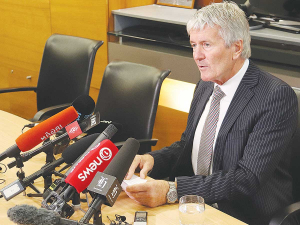Damien O’Connor: NZ united on global trade
When it comes to international trade, politicians from all sides of the aisle are united, says Labour's trade spokesman Damien O'Connor.
 Agriculture Minister Damien O'Connor fronting at a media conference last week to announce the Government's impending ban on live animal exports.
Agriculture Minister Damien O'Connor fronting at a media conference last week to announce the Government's impending ban on live animal exports.
Concerns about the threat posed to New Zealand's trading reputation by live animal exports from this country have led to a move to shut down the trade.
Agriculture Minister Damien O'Connor gave this as the main reason for the Government's decision to ban all livestock exports from NZ, within two years, at an announcement last week.
He says live cattle exports from NZ has been a feature of the country's farming system for a long time and despite banning exports of livestock for slaughter in 2008, problems had not gone away.
Figures show that the number of cows exported overseas - mainly to China - since 2010 has risen from just over 26,000 to over 113,000 last year.
O'Connor says a number of reviews have been conducted into this trade, including one following the sinking of the Gulf Livestock 2 in 2020. He says the independent National Animal Welfare Advisory Committee recommended the trade stop.
"Over recent years, we have seen some reports that many of the ships carrying livestock are not designed for live exports and where conditions have led to adverse welfare outcomes," he claimed. "The fact is that once animals leave NZ by sea, we have very little ability to ensure their wellbeing before they reach their destination and that is an unacceptable risk for us."
O'Connor claims at the heart of the decision is upholding NZ's reputation for high standards in animal welfare. He says "we must stay ahead of the curve in a world where animal welfare is under increasing scrutiny."
He says the Chinese government was advised about the decision before the public announcement - as was Australia. But O'Connor emphasised that the issue was about animal welfare and not China.
"As an industry, across the sector, we are moving from volume to value and this area of animal welfare is one we have to move on to ensure we are fully compliant - not just on farm but in any transport issue," O'Connor added.
"I recognise the importance of our trade relationships with our international partners and we're committed to working with them as we transition away from the shipment of livestock. We have an opportunity to boost trade through our cutting-edge scientific work into dairy cow genetics and germplasm use."
Two Year Transition
Damien O'Connor says he appreciates that there is an existing live export trade and that some people have made a significant investment in it.
This is why there is a two year maximum transition period, so that people can wind down the trade and adjust their operations.
"This is a complex process to unwind, so the final exact length of the transition period will be determined pending further advice from MPI," O'Connor added. "I have also asked them (MPI) to provide advice on possible improvements to animals on ships during the transition period."
O'Connor accepts that during the transition period there is a risk, but says everything possible will be done to mitigate any such risks.
He claims the transition period will give those farmers affected by the ban time to adjust their operations and work out what to do with animals they are currently sending overseas.
O'Connor noted that the shipment of livestock by air (a very miniscule number) is not affected by the ban because he claims the travel times are shorter and generally the animals are well looked after.
The Meat Industry Association of New Zealand (MIA) today announced that Chief Executive Officer Sirma Karapeeva has resigned from the role.
The winners of the 2026 Hawke’s Bay/Wairarapa Dairy Industry Awards were announced at the annual awards dinner held at Copthorne Solway Park in Masterton on Thursday evening.
Environment Southland is welcoming this week’s decision by the Environmental Protection Authority (EPA) to approve the release of Blaptea elguetai, a leaf‑feeding beetle that will help control the highly invasive Chilean flame creeper.
This March, the potato industry is proudly celebrating International Women’s Day on 8 March alongside the International Year of the Woman Farmer, recognising the vital role women play across every part of the sector — from paddocks and packhouses to research, leadership, and innovation.
Fruit trader Seeka posted a record profit and returns to shareholders in 2025.
Recent weather events in the Bay of Plenty, Gisborne/Tairawhiti, and Canterbury have been declared a medium-scale adverse event.